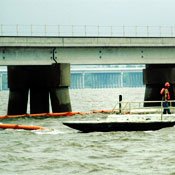A Greenwood, Miss., attorney is accusing BP of racketeering in a lawsuit filed in northern Mississippi's U.S. District Court, yesterday. Hiram Eastland is one of several attorneys--including New York attorney and environmental preservation advocate Robert Kennedy--filing a series of Racketeering Influenced and Corrupt Organizations class-action complaints in Mississippi, Florida and Louisiana against Transocean, LTD and BP, the companies responsible for the Gulf of Mexico oil spill.
The suit alleges that BP misled the public and officials about deep-water oil drilling safety and that the company infiltrated the U.S. Minerals Management Service, to inaccurately report that it had the ability to immediately stop an oil spill similar to the April 20 disaster in the Gulf.
"In order to obtain oil and offshore drilling and billions of dollars, the oil companies lied through their teeth about their ability to address a deepwater oil spill," said Eastland, who is representing plaintiff Mid-South Seafood and plaintiffs in Florida and Louisiana.
The suit, which represents only one side of a legal argument, alleges that BP caused the Gulf of Mexico catastrophe by cultivating a corporate culture "fueled by greed, fraud, dishonesty and a disregard of numerous laws and regulations."
Plaintiffs, which include Florida property owner Robert Rinke, point to a plethora of criminal fines imposed upon the company from the Occupational Health and Safety Administration, including a $87 million fine for failing to address safety problems at BP's Texas City Refinery--following a 2005 deadly blast at the same refinery, which earned the company a $50 million fine. The suit claims that BP refineries in Ohio and Texas account for 97 percent of "egregious willful" violations OSHA handed out within the last three years.
Eastland accuses BP of committing wire and mail fraud and references a Feb. 23, 2009, document titled "Initial Exploration Plan Mississippi Canyon Block 252" the company sent to the MMS, the federal agency charged with regulating offshore drilling. In that document, BP claims that in the event of a blow-out the resulting spill "is unlikely to have an impact based on the industry-wide standards for using proven equipment and technology for such responses.
BP claims the company's Regional Oil Response Plan addresses available equipment and personnel, techniques for containment, and recovery and removal of the oil spill."
The suit, however, references a May 10 BP statement in which the company claimed that "all of the techniques being attempted or evaluated to contain the flow of oil on the seabed involve significant uncertainties because they have not been tested in these conditions before."
The class-action complaint also criticizes BP officials working directly inside MMS, alleging that the oil industry, and BP in particular, engaged in a culture of corruption and then "used the BP and MMS enterprise to turn what began as a watchdog policing agency into an agency of BP yes-men."
BP could not be reached immediately for comment, although spokesman Toby Odone told the Jackson Free Press in July that the company does not speak on matters in litigation. "That's the company policy," Odone said.



Comments
Use the comment form below to begin a discussion about this content.
comments powered by Disqus